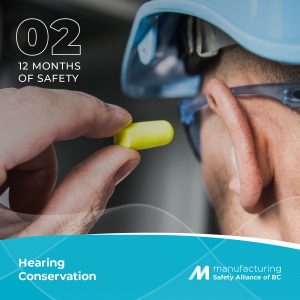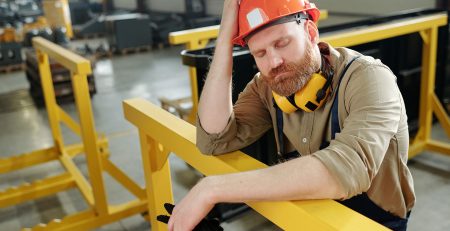Hearing loss in the workplace IS preventable – Make hearing conservation an injury prevention strategy
In March, we recognize World Hearing Day (March 3) – an annual global advocacy event that calls for action to address hearing loss.
Hearing loss is more common than you might think – an estimated 54 percent of Canadians, ages 40-79, have a least mild hearing loss. Occupational hearing loss can happen when workers are exposed to loud noise or chemicals that affect hearing.
Hearing loss isn’t easy to notice, but overexposure to loud noises decreases our ability to hear with time. When you experience excessive noise, damage occurs to tiny sensory cells (microscopic hair cells) deep inside your ear, so there’s no way to see the damage, and there is no pain.
We sat down with Alliance Associate member TJs Workplace Hearing Testing to talk about hearing loss in the workplace.
How prevalent is hearing loss in the workplace?
It is widespread to see hearing loss due to noise in the workplace. In our experience, the risk of noise-induced hearing loss can vary from industry to industry, but the truth remains: noise will cause damage to our ears
What are some of the most significant contributors to hearing loss at work?
Exposure to machinery noise and improper use of hearing protective devices are two significant contributors to hearing loss on the job.
How preventable is workplace hearing loss?
Workplace hearing loss is 100% preventable as long as employees make a conscious effort to wear hearing protection correctly. Hearing protection devices, like other PPE – such as safety vests, safety boots, and goggles – minimize the risk of hearing loss and injury in the workplace.
What are some of the key things businesses should consider to protect workers’ hearing?
Business owners and operators should think of hearing tests as a wellness and health issue instead of a compliance issue. Many companies have employee group benefits for vision and dental coverage – but those plans don’t always cover hearing tests. Hearing tests help prevent and manage hearing loss and are critical for health management, just like vision and dental care.
Where do you see opportunities to improve hearing conservation programs in your work with businesses?
In our experience, businesses can improve their hearing conservation programs in three ways:
- Shift their mindset from compliance to wellness when it comes to hearing
- Have consistent annual hearing tests for workers – especially those regularly exposed to excessive noise on the job
- Improve their selection of hearing protection devices
How critical is PPE/hearing protection in preventing hearing loss?
PPE and hearing protection devices are extremely critical to prevent hearing loss in workers.
How often should workers have a hearing test?
Workers should have their hearing tested at least once a year, just like their regular eye doctor and dentist visits.
What’s the single best way to prevent hearing loss?
Both employers and workers should collaborate to make noise-induced hearing loss a preventable workplace injury. According to WorkSafeBC, employers can take measures to prevent noise-induced hearing loss through the following:
- Ensure all workers at risk wear sufficient hearing protection that fits and understands how to wear it properly.
- Ensure workers insert or wear the appropriate hearing protection before entering a noisy environment and wear it until after exiting the noisy location.
- Rotate workers to different positions, spending less time in noisy environments.
- Identify potential engineering controls to mitigate the risk of exposure.
- Ensure workers have their hearing tested and are aware of their hearing test results.
Annual hearing tests and proper use of hearing protection devices can help prevent any further noise-induced hearing loss in the workplace. Wearing appropriate hearing protection should be as habitual as putting on safety boots, glasses, and vests.
What are some of the impacts of hearing loss for workers?
Hearing loss can significantly change a worker’s quality of life. Workers with hearing loss may miss hearing necessary auditory cues such as forklifts or verbal instructions in the workplace, especially in a noisy environment. Outside of work, hearing loss can lead to social anxiety, depression, and isolation.
Tell us how you got started as a company?
TJs Hearing started in 2002 as a small, family-owned and operated business working in the industry for close to 20 years. Hearing conservation is achievable. Noise-induced hearing loss is permanent, but it’s also 100% preventable. As a family-owned company, we are proud of our professionalism and efficiency when working with our clients. We are your trusted partner in hearing conservation.
Learn more about TJ’s Workplace Hearing Testing on our website.
Check out more hearing conservation tools and resources – March’s topic in our 12 months of safety!




